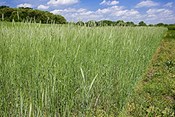Agricultural Research Service (ARS) scientists may soon find a way to enhance the weed-killing capabilities of a cereal grain that enriches the soil when used as a winter cover crop.
Rye is often grown in winter and killed in the spring, so the dead stalks can be flattened over soybean and vegetable fields to block sunlight and prevent spring weeds from getting the light they need to germinate. The effect makes rye a popular alternative for organic farmers who grow crops without herbicides. Rye’s roots also capture nutrients and hold the soil in place, reducing erosion and run off.
John Teasdale, research leader of the ARS Sustainable Agricultural Systems Laboratory in Beltsville, Md., is working with ARS chemist Cliff Rice to see whether organic compounds released by rye in the soil play a role in suppressing weeds and whether those compounds can be exploited to improve rye’s weed-killing capabilities. Although compounds in rye are known to inhibit weed growth, little is known about how they behave in the soil.
Teasdale and Rice grew rye in winter, killed it in spring and either tilled the stalks shallowly into the soil or left them untilled on the surface. They then took weekly soil samples to extract chemicals from them and tested the soils to see how lettuce and pigweed grew in them. They also measured levels of a family of organic compounds called benzoxazinoids, released from the rye, which are believed to play a role in weed suppression.
The researchers found that weeds began to grow better as concentrations of the compounds diminished, within a few weeks of when the rye was killed. The compounds reached peak levels about a week after the rye was killed and dropped significantly within two or three weeks. The preliminary results suggest that the benzoxazinoids do affect soil chemistry and may enhance rye’s weed-suppressing ability.
The work is part of an effort to clarify such issues as how long rye should be grown before being killed, the amount of biomass needed to maximize its effects, and the impact of weather and soil conditions on its effectiveness.
Read more about this research in the October 2009 issue of Agricultural Research magazine. ARS is the principal intramural scientific research agency of the U.S. Department of Agriculture.




